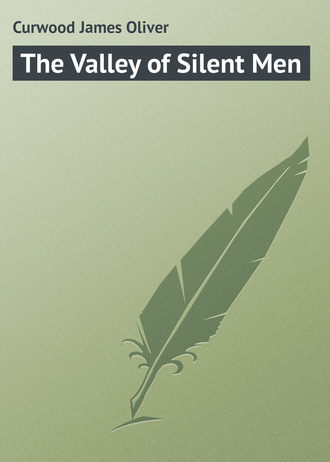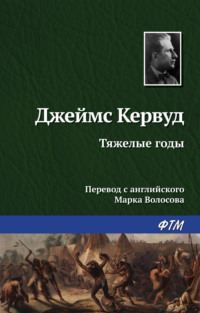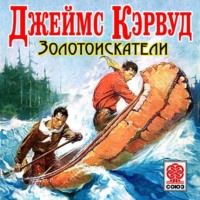
The Valley of Silent Men
And feeling that the way had at last been made easy for him, Kent smiled out into the glorious day and whispered softly, as if she were standing there, listening to him:
"If I had lived – I would have called you – my Quebec. It's pretty, that name. It stands for a lot. And so do you."
And out in the hall, as Kent whispered those words, stood Father Layonne, with a face that was whiter than the mere presence of death had ever made it before. At his side stood Cardigan, aged ten years since he had placed his stethoscope at Kent's chest that morning. And behind these two were Kedsty, with a face like gray rock, and young Mercer, in whose staring eyes was the horror of a thing he could not yet quite comprehend. Cardigan made an effort to speak and failed. Kedsty wiped his forehead, as he had wiped it the morning of Kent's confession. And Father Layonne, as he went to Kent's door, was breathing softly to himself a prayer.
CHAPTER VII
From the window, the glorious day outside, and the vision he had made for himself of Marette Radisson, Kent turned at the sound of a hand at his door and saw it slowly open. He was expecting it. He had read young Mercer like a book. Mercer's nervousness and the increased tightening of the thing in his chest had given him warning. The thing was going to happen soon, and Father Layonne had come. He tried to smile, that he might greet his wilderness friend cheerfully and unafraid. But the smile froze when the door opened and he saw the missioner standing there.
More than once he had accompanied Father Layonne over the threshold of life into the presence of death, but he had never before seen in his face what he saw there now. He stared. The missioner remained in the doorway, hesitating, as if at the last moment a great fear held him back. For an interval the eyes of the two men rested upon each other in a silence that was like the grip of a living thing. Then Father Layonne came quietly into the room and closed the door behind him.
Kent drew a deep breath and tried to grin. "You woke me out of a dream," he said, "a day-dream. I've had a very pleasant experience this morning, mon père."
"So some one was trying to tell me, Jimmy," replied the little missioner with an effort to smile back.
"Mercer?"
"Yes. He told me about it confidentially. The poor boy must have fallen in love with the young lady."
"So have I, mon père. I don't mind confessing it to you. I'm rather glad. And if Cardigan hadn't scheduled me to die – "
"Jimmy," interrupted the missioner quickly, but a bit huskily, "has it ever occurred to you that Doctor Cardigan may be mistaken?"
He had taken one of Kent's hands. His grip tightened. It began to hurt. And Kent, looking into his eyes, found his brain all at once like a black room suddenly illuminated by a flash of fire. Drop by drop the blood went out of his face until it was whiter than Father Layonne's.
"You – you don't – mean – "
"Yes, yes, boy, I mean just that," said the missioner, in a voice so strange that it did not seem to be his own. "You are not going to die, Jimmy. You are going to live!"
"Live!" Kent dropped back against his pillows. "Live!" His lips gasped the one word.
He closed his eyes for an instant, and it seemed to him that the world was aflame. And he repeated the word again, but only his lips formed it, and there came no sound. His senses, strained to the breaking-point to meet the ordeal of death, gave way slowly to the mighty reaction. He felt in those moments like a reeling man. He opened his eyes, and there was a meaningless green haze through the window where the world should have been. But he heard Father Layonne's voice. It seemed a great distance off, but it was very clear. Doctor Cardigan had made an error, it was saying. And Doctor Cardigan, because of that error, was like a man whose heart had been taken out of him. But it was an excusable error.
If there had been an X-ray – But there had been none. And Doctor Cardigan had made the diagnosis that nine out of ten good surgeons would probably have made. What he had taken to be the aneurismal blood-rush was an exaggerated heart murmur, and the increased thickening in his chest was a simple complication brought about by too much night air. It was too bad the error had happened. But he must not blame Cardigan!
He must not blame Cardigan! Those last words pounded like an endless series of little waves in Kent's brain. He must not blame Cardigan! He laughed, laughed before his dazed senses readjusted themselves, before the world through the window pieced itself into shape again. At least he thought he was laughing. He must – not – blame – Cardigan! What an amazingly stupid thing for Father Layonne to say! Blame Cardigan for giving him back his life? Blame him for the glorious knowledge that he was not going to die? Blame him for —
Things were coming clearer. Like a bolt slipping into its groove his brain found itself. He saw Father Layonne again, with his white, tense face and eyes in which were still seated the fear and the horror he had seen in the doorway. It was not until then that he gripped fully at the truth.
"I – I see," he said. "You and Cardigan think it would have been better if I had died!"
The missioner was still holding his hand. "I don't know, Jimmy, I don't know. What has happened is terrible."
"But not so terrible as death," cried Kent, suddenly growing rigid against his pillows. "Great God, mon père, I want to live! Oh – "
He snatched his hand free and stretched forth both arms to the open window. "Look at it out there! My world again! MY WORLD! I want to go back to it. It's ten times more precious to me now than it was. Why should I blame Cardigan? Mon père-mon père-listen to me. I can say it now, because I've got a right to say it. I lied. I didn't kill John Barkley!"
A strange cry fell from Father Layonne's lips. It was a choking cry, a cry, not of rejoicing, but of a grief-stung thing. "Jimmy!"
"I swear it! Great heaven, mon père, don't you believe me?"
The missioner had risen. In his eyes and face was another look. It was as if in all his life he had never seen James Kent before. It was a look born suddenly of shock, the shock of amazement, of incredulity, of a new kind of horror. Then swiftly again his countenance changed, and he put a hand on Kent's head.
"God forgive you, Jimmy," he said. "And God help you, too!"
Where a moment before Kent had felt the hot throb of an inundating joy, his heart was chilled now by the thing he sensed in Father Layonne's voice and saw in his face and eyes. It was not entirely disbelief. It was a more hopeless thing than that.
"You do not believe me!" he said.
"It is my religion to believe, Jimmy," replied Father Layonne in a gentle voice into which the old calmness had returned. "I must believe, for your sake. But it is not a matter of human sentiment now, lad. It is the Law! Whatever my heart feels toward you can do you no good. You are – " He hesitated to speak the words.
Then it was that Kent saw fully and clearly the whole monstrous situation. It had taken time for it to fasten itself upon him. In a general way it had been clear to him a few moments before; now, detail by detail, it closed in upon him, and his muscles tightened, and Father Layonne saw his jaw set hard and his hands clench. Death was gone. But the mockery of it, the grim exultation of the thing over the colossal trick it had played, seemed to din an infernal laughter in his ears. But – he was going to live! That was the one fact that rose above all others. No matter what happened to him a month or six months from now, he was not going to die today. He would live to receive Mercer's report. He would live to stand on his feet again and to fight for the life which he had thrown away. He was, above everything else, a fighting man. It was born in him to fight, not so much against his fellow men as against the overwhelming odds of adventure as they came to him. And now he was up against the deadliest game of all. He saw it. He felt it. The thing gripped him. In the eyes of that Law of which he had so recently been a part he was a murderer. And in the province of Alberta the penalty for killing a man was hanging. Because horror and fear did not seize upon him, he wondered if he still realized the situation. He believed that he did. It was merely a matter of human nature. Death, he had supposed, was a fixed and foregone thing. He had believed that only a few hours of life were left for him. And now it was given back to him, for months at least. It was a glorious reprieve, and —
Suddenly his heart stood still in the thrill of the thought that came to him. Marette Radisson had known that he was not going to die! She had hinted the fact, and he, like a blundering idiot, had failed to catch the significance of it. She had given him no sympathy, had laughed at him, had almost made fun of him, simply because she knew that he was going to live!
He turned suddenly on Father Layonne.
"They shall believe me!" he cried. "I shall make them believe me! Mon père, I lied! I lied to save Sandy McTrigger, and I shall tell them why. If Doctor Cardigan has not made another mistake, I want them all here again. Will you arrange it?"
"Inspector Kedsty is waiting outside," said Father Layonne quietly, "but I should not act in haste, Jimmy. I should wait. I should think – think."
"You mean take time to think up a story that will hold water, mon père? I have that. I have the story. And yet – " He smiled a bit dismally. "I did make one pretty thorough confession, didn't I, Father?"
"It was very convincing, Jimmy. It went so particularly into the details, and those details, coupled with the facts that you were seen at John Barkley's earlier in the evening, and that it was you who found him dead a number of hours later – "
"All make a strong case against me," agreed Kent. "As a matter of fact, I was up at Barkley's to look over an old map he had made of the Porcupine country twenty years ago. He couldn't find it. Later he sent word he had run across it. I returned and found him dead."
The little missioner nodded, but did not speak.
"It is embarrassing," Kent went on. "It almost seems as though I ought to go through with it, like a sport. When a man loses, it isn't good taste to set up a howl. It makes him sort of yellow-backed, you know. To play the game according to rules, I suppose I ought to keep quiet and allow myself to be hung without making any disturbance. Die game, and all that, you know. Then there is the other way of looking at it. This poor neck of mine depends on me. It has given me a lot of good service. It has been mighty loyal. It has even swallowed eggs on the day it thought it was going to die. And I'd be a poor specimen of humanity to go back on it now. I want to do that neck a good turn. I want to save it. And I'm going to – if I can!"
In spite of the unpleasant tension of the moment, it cheered Father Layonne to see this old humor returning into the heart of his friend. With him love was an enduring thing. He might grieve for James Kent, he might pray for the salvation of his soul, he might believe him guilty, yet he still bore for him the affection which was too deeply rooted in his heart to be uptorn by physical things or the happenings of chance. So the old cheer of his smile came back, and he said:
"To fight for his life is a privilege which God gives to every man, Jimmy. I was terrified when I came to you. I believed it would have been better if you had died. I can see my error. It will be a terrible fight. If you win, I shall be glad. If you lose, I know that you will lose bravely. Perhaps you are right. It may be best to see Inspector Kedsty before you have had time to think. That point will have its psychological effect. Shall I tell him you are prepared to see him?"
Kent nodded. "Yes. Now."
Father Layonne went to the door. Even there he seemed to hesitate an instant, as if again to call upon Kent to reconsider. Then he opened it and went out.
Kent waited impatiently. His hand, fumbling at his bedclothes, seized upon the cloth with which he had wiped his lips, and it suddenly occurred to him that it had been a long time since it had shown a fresh stain of blood. Now that he knew it was not a deadly thing, the tightening in his chest was less uncomfortable. He felt like getting up and meeting his visitors on his feet. Every nerve in his body wanted action, and the minutes of silence which followed the closing of the door after the missioner were drawn out and tedious to him. A quarter of an hour passed before he heard returning footsteps, and by the sound of them he knew Kedsty was not coming alone. Probably le pere would return with him. And possibly Cardigan.
What happened in the next few seconds was somewhat of a shock to him. Father Layonne entered first, and then came Inspector Kedsty. Kent's eyes shot to the face of the commander of N Division. There was scarcely recognition in it. A mere inclination of the head, not enough to call a greeting, was the reply to Kent's nod and salute. Never had he seen Kedsty's face more like the face of an emotionless sphinx. But what disturbed him most was the presence of people he had not expected. Close behind Kedsty was McDougal, the magistrate, and behind McDougal entered Constables Felly and Brant, stiffly erect and clearly under orders. Cardigan, pale and uneasy, came in last, with the stenographer. Scarcely had they entered the room when Constable Pelly pronounced the formal warning of the Criminal Code of the Royal Northwest Mounted Police, and Kent was legally under arrest.
He had not looked for this. He knew, of course, that the process of the Law would take its course, but he had not anticipated this bloodthirsty suddenness. He had expected, first of all, to talk with Kedsty as man to man. And yet – it was the Law. He realized this as his eyes traveled from Kedsty's rock-like face to the expressionless immobility of his old friends, Constables Pelly and Brant. If there was sympathy, it was hidden except in the faces of Cardigan and Father Layonne. And Kent, exultantly hopeful a little while before, felt his heart grow heavy within him as he waited for the moment when he would begin the fight to repossess himself of the life and freed which he had lost.
CHAPTER VIII
For some time after the door to Kent's room had closed upon the ominous visitation of the Law, young Mercer remained standing in the hall, debating with himself whether his own moment had not arrived. In the end he decided that it had, and with Kent's fifty dollars in his pocket he made for the shack of the old Indian trailer, Mooie. It was an hour later when he returned, just in time to see Kent's door open again. Doctor Cardigan and Father Layonne reappeared first, followed in turn by the blonde stenographer, the magistrate, and Constables Pelly and Brant. Then the door closed.
Within the room, sweating from the ordeal through which he had passed, Kent sat bolstered against his pillows, facing Inspector Kedsty with blazing eyes.
"I've asked for these few moments alone with you, Kedsty, because I wanted to talk to you as a man, and not as my superior officer. I am, I take it, no longer a member of the force. That being the case, I owe you no more respect than I owe to any other man. And I am pleased to have the very great privilege of calling you a cursed scoundrel!"
Kedsty's face was hot, but as his hands clenched slowly, it turned redder. Before he could speak, Kent went on.
"You have not shown me the courtesy or the sympathy you have had for the worst criminals that ever faced you. You amazed every man that was in this room, because at one time – if not now – they were my friends. It wasn't what you said. It was how you said it. Whenever there was an inclination on their part to believe, you killed it – not honestly and squarely, by giving me a chance. Whenever you saw a chance for me to win a point, you fell back upon the law. And you don't believe that I killed John Barkley. I know it. You called me a liar the day I made that fool confession. You still believe that I lied. And I have waited until we were alone to ask you certain things, for I still have something of courtesy left in me, if you haven't. What is your game? What has brought about the change in you? Is it – "
His right hand clenched hard as a rock as he leaned toward Kedsty.
"Is it because of the girl hiding up at your bungalow, Kedsty?"
Even in that moment, when he had the desire to strike the man before him, it was impossible for him not to admire the stone-like invulnerability of Kedsty. He had never heard of another man calling Kedsty a scoundrel or dishonest. And yet, except that his faced burned more dully red, the Inspector was as impassively calm as ever. Even Kent's intimation that he was playing a game, and his direct accusation that he was keeping Marette Radisson in hiding at his bungalow, seemed to have no disturbing effect on him. For a space he looked at Kent, as if measuring the poise of the other's mind. When he spoke, it was in a voice so quiet and calm that Kent stared at him in amazement.
"I don't blame you, Kent," he said. "I don't blame you for calling me a scoundrel, or anything else you want to. I think I should do the same if I were in your place. You think it is incredible, because of our previous association, that I should not make every effort to save you. I would, if I thought you were innocent. But I don't. I believe you are guilty. I cannot see where there is a loophole in the evidence against you, as given in your own confession. Why, man, even if I could help to prove you innocent of killing John Barkley – "
He paused and twisted one of his gray mustaches, half facing the window for a moment. "Even if I did that," he went on, "you would still have twenty years of prison ahead of you for the worst kind of perjury on the face of the earth, perjury committed at a time when you thought you were dying! You are guilty, Kent. If not of one thing, then of the other. I am not playing a game. And as for the girl – there is no girl at my bungalow."
He turned to the door; and Kent made no effort to stop him. Words came to his lips and died there, and for a space after Kedsty had gone he stared out into the green forest world beyond his window, seeing nothing. Inspector Kedsty, quietly and calmly, had spoken words that sent his hopes crashing in ruin about him. For even if he escaped the hangman, he was still a criminal – a criminal of the worst sort, perhaps, next to the man who kills another. If he proved that he had not killed John Barkley, he would convict himself, at the same time, of having made solemn oath to a lie on what he supposed was his death-bed. And for that, a possible twenty years in the Edmonton penitentiary! At best he could not expect less than ten. Ten years – twenty years – in prison! That, or hang.
The sweat broke out on his face. He did not curse Kedsty now. His anger was gone. Kedsty had seen all the time what he, like a fool, had not thought of. No matter how the Inspector might feel in that deeply buried heart of his, he could not do otherwise than he was doing. He, James Kent, who hated a lie above all the things on the earth, was kin-as-kisew – the blackest liar of all, a man who lied when he was dying.
And for that lie there was a great punishment. The Law saw with its own eyes. It was a single-track affair, narrow-visioned, caring nothing for what was to the right or the left. It would tolerate no excuse which he might find for himself. He had lied to save a human life, but that life the Law itself had wanted. So he had both robbed and outraged the Law, even though a miracle saved him the greatest penalty of all.
The weight of the thing crushed him. It was as if for the first time a window had opened for him, and he saw what Kedsty had seen. And then, as the minutes passed, the fighting spirit in him rose again. He was not of the sort to go under easily. Personal danger had always stirred him to his greatest depths, and he had never confronted a danger greater than this he was facing now. It was not a matter of leaping quickly and on the spur of the moment. For ten years his training had been that of a hunter of men, and the psychology of the man hunt had been his strong point. Always, in seeking his quarry, he had tried first to bring himself into a mental sympathy and understanding with that quarry. To analyze what an outlaw would do under certain conditions and with certain environments and racial inheritances behind him was to Kent the premier move in the thrilling game. He had evolved rules of great importance for himself, but always he had worked them out from the vantage point of the huntsman. Now he began to turn them around. He, James Kent, was no longer the hunter, but the hunted, and all the tricks which he had mastered must now be worked the other way. His woodcraft, his cunning, the fine points he had learned of the game of one-against-one would avail him but little when it came to the witness chair and a trial.
The open window was his first inspiration. Adventure had been the blood of his life. And out there, behind the green forests rolling away like the billows of an ocean, lay the greatest adventure of all. Once in those beloved forests covering almost the half of a continent, he would be willing to die if the world beat him. He could see himself playing the game of the hunted as no other man had ever played it before. Let him once have his guns and his freedom, with all that world waiting for him —
Eagerness gleamed in his eyes, and then, slowly, it died out. The open window, after all, was but a mockery. He rolled sideways from his bed and partly balanced himself on his feet. The effort made him dizzy. He doubted if he could have walked a hundred yards after climbing through the window. Instantly another thought leaped into his brain. His head was clearing. He swayed across the room and back again, the first time he had been on his feet since the half-breed's bullet had laid him out. He would fool Cardigan. He would fool Kedsty. As he recovered his strength, he would keep it to himself. He would play sick man to the limit, and then some night he would take advantage of the open window!
The thought thrilled him as no other thing in the world had ever thrilled him before. For the first time he sensed the vast difference between the hunter and the hunted, between the man who played the game of life and death alone and the one who played it with the Law and all its might behind him. To hunt was thrilling. To be hunted was more thrilling. Every nerve in his body tingled. A different kind of fire burned in his brain. He was the creature who was at bay. The other fellow was the hunter now.
He went back to the window and leaned far out. He looked at the forest and saw it with new eyes. The gleam of the slowly moving river held a meaning for him that it had never held before. Doctor Cardigan, seeing him then, would have sworn the fever had returned. His eyes held a slumbering fire. His face was flushed. In these moments Kent did not see death. He was not visioning the iron bars of a prison. His blood pulsed only to the stir of that greatest of all adventures which lay ahead of him. He, the best man-hunter in two thousand miles of wilderness, would beat the hunters themselves. The hound had turned fox, and that fox knew the tricks of both the hunter and the hunted. He would win! A world beckoned to him, and he would reach the heart of that world. Already there began to flash through his mind memory of the places where he could find safety and freedom for all time. No man in all the Northland knew its out-of-the-way corners better than he – its unmapped and unexplored places, the far and mysterious patches of terra incognita, where the sun still rose and set without permission of the Law, and God laughed as in the days when prehistoric monsters fed from the tops of trees no taller than themselves. Once through that window, with the strength to travel, and the Law might seek him for a hundred years without profit to itself.
It was not bravado in his blood that stirred these thoughts. It was not panic or an unsound excitement. He was measuring things even as he visioned them. He would go down-river way, toward the Arctic. And he would find Marette Radisson! Yes, even though she lived at Barracks at Fort Simpson, he would find her! And after that? The question blurred all other questions in his mind. There were many answers to it.









